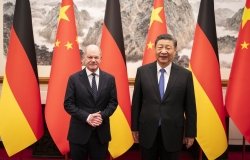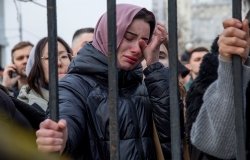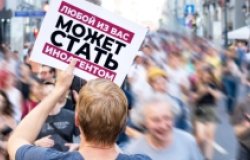Author Hochschild Recounts Lost History of Horror in the Belgian Congo
Reported by Mary-Lea Cox
When the day of reckoning comes for our era, European colonialism should rank equally with the evils of fascism and communism, said writer Adam Hochschild at an October 14 Director's Forum. Hochschild bases this assertion on the findings of his award-winning book King Leopold's Ghost: A Story of Greed, Terror, and Heroism in Colonial Africa. The book reconstructs the period from 1884 to 1907 when King Leopold II of Belgium occupied the territory that became Zaire and is known today as the Democratic Republic of the Congo. According to Hochschild, Leopold profited from the Congo's rubber, ivory and other riches -- but at the cost of the lives of some 10 million Congolese. And what is even more appalling, few of us have ever heard of King Leopold, whereas Hitler and Stalin are household names.
Hochschild said that the time had also arrived to celebrate the part played by an early group of human rights activists in putting an end to Leopold's atrocities. In his view, their leader, Edmund Morel, is one of this century's unsung heroes.
Rubber at all costs
The European scramble for Africa was, in the words of Hochschild, the "largest single land grab in history." The colonization of Africa happened quickly (between 1860 and 1910) and was a "very bloody business" -- nowhere more so than in in the Belgian Congo. King Leopold seized for himself the vast and largely unexplored territory surrounding the Congo River. Western powers -- beginning with the U.S., which was first to give Leopold its official blessing -- turned a blind eye to Leopold's nefarious doings.
The event that transformed Leopold's -- and the Congo's -- fortunes was the invention of the inflatable bicycle tire in 1887 (followed soon after by the automobile tire). This created an insatiable demand for rubber, and Leopold's colony, with its great equatorial rainforests full of wild rubber, was ripe for plundering.
Leopold devised a system of terror in which entire Congolese villages were forced to harvest rubber or face death by their Belgian overseers. The women were taken hostage, and many of them starved to death while the men were sent to gather a monthly quota of rubber -- and often worked themselves to death in the process.
There was no escape, Hochschild said. Those who tried to flee would usually die in the rainforest. And rebellions did not work as King Leopold had a superior army -- and used it to shoot down the Congolese in great numbers.
The statistics tell the story: between 1880 and 1920, the Congolese population was halved. Around 10 million Congolese lost their lives.
Moreover, claimed Hochschild, this was not a unique villainy on the part of the Belgians. In other parts of Africa where colonial powers -- especially, Germany, France, and Portugal -- imitated King Leopold's methods, the statistics are similarly grim.
Edmund Morel, an under-sung hero
But Hochschild's tale is not only about what Joseph Conrad called the "heart of darkness." It is also about the "great human rights movement" that raged against Leopold during the first ten years of this decade. Led by Edmund Dean Morel, an Englishman who had worked for the British shipping line with a monopoly on shipping rubber out of the Congo, the movement consisted of a group of concerned individuals in several countries, and as such was the first international human rights movement -- the precursor to Amnesty International and the War Crimes Tribunals, Hochschild said.
When working at the docks in Antwerp, Morel noticed that, while the ships coming in from the Congo were loaded with ivory and rubber, those going back contained nothing but soldiers, firearms, and ammunition. He surmised that the rubber industry depended not on trade but on slave labor.
Morel tried talking to his bosses but was told to keep quiet. So he quit the company and reinvented himself as an investigative journalist, using his "torrential energy" to start up a campaign against Leopold. Joined by noteworthies such as Mark Twain and the Archbishop of Canterbury, Morel eventually succeeded in attracting press attention to the massacre taking place in the Congo, and this put pressure on King Leopold to cease his abuses. Morel's feat is all the more impressive considering the difficulty of international communications at that time, pointed out Hochschild.
Although some of Hochschild's critics have disputed whether the cessation of violence in the Congo was due to Morel's campaign or to the fact that genocide eventually became unprofitable (see Zachary Karabell's review for Salon Magazine), Hochschild said he derives great hope from Morel's example as well as certain lessons for our time about the need to support "institutions capable of transcending national boundaries in pursuit of justice." That way, we will be able to apprehend the King Leopolds and the Pinochets of the future, Hochschild said.
Still turning a blind eye
Reflecting on his experience of writing the book, Hochschild said that, given the enormous loss of life in the Congo, he was astounded to find no canon of works, scholarly or otherwise, on this topic, such as there are on the Holocaust. This is even more astounding considering that information on Leopold's atrocities is easy to obtain. Indeed, Hochschild was able to do 90% of his research in the University of California at Berkeley and Stanford University libraries, close to where he lives. His sources included publications by Morel and by the African-American journalist George Washington Williams, who was the first to report on the atrocities in the Congo.
Hochschild also found it surprisingly difficult to find a publisher. Nine out of ten leading New York publishers turned down the manuscript, saying that general readers would not be interested in African history.
Hochschild's sense was that an entire history had been erased. Responding to a question from a member of the audience, he noted that Belgian history books omit the true story of King Leopold. In Hochschild's view, this is on a par with Japan's failure to include its World War II atrocities in school textbooks, but while we condemn the Japanese for not facing their history, we have left the Belgians alone.
So why has this tale of genocide and greed so rarely been told? Hochschild thought that the events of later in the century -- resulting from the twin evils of fascism and communism -- had overshadowed the evil of European colonialism. Also, we have not yet overcome the legacy of King Leopold's efforts to persuade the Western world of his noble intentions toward Africa. As Hochschild tells it, Leopold was a "master of public relations," and to this day, there are many -- including a "vocal group of old colonials" in Belgium -- who continue to think of Leopold as a "great hero," who was helping out the Congolese by getting rid of their Arab oppressors and bringing them Western religion and culture.
And, although the U.S. did not take part in the colonizing of Africa, it played a decisive role in propping up King Leopold. The U.S. was the first country to recognize officially Leopold's personal claim to the Congo, which allowed Leopold to persuade European countries to do the same. Leopold's success in the U.S. was due to a "brilliant lobbying effort," Hochschild said, comprising many of the same tactics that still go on in Washington today.
In failing to recognize King Leopold as the "most spectacular plunderer of the colonial years," the U.S. went on to back Mobuto Sese Seko, the "most spectacular plunderer of the post-colonial Zaire," Hochschild observed. Today as before, the U.S. and its allies turn a blind eye toward Africa, as evidenced by their recent failure to intervene to halt the genocide in Rwanda and by their exclusion of Africa from discussions of the new world trade order, Hochschild said.
Against this background, is it any wonder that the Congo of today is a scene of political, social, and economic instability? The consequences of colonial greed have been devastating for Africa and are still reverberating, Hochschild remarked.









